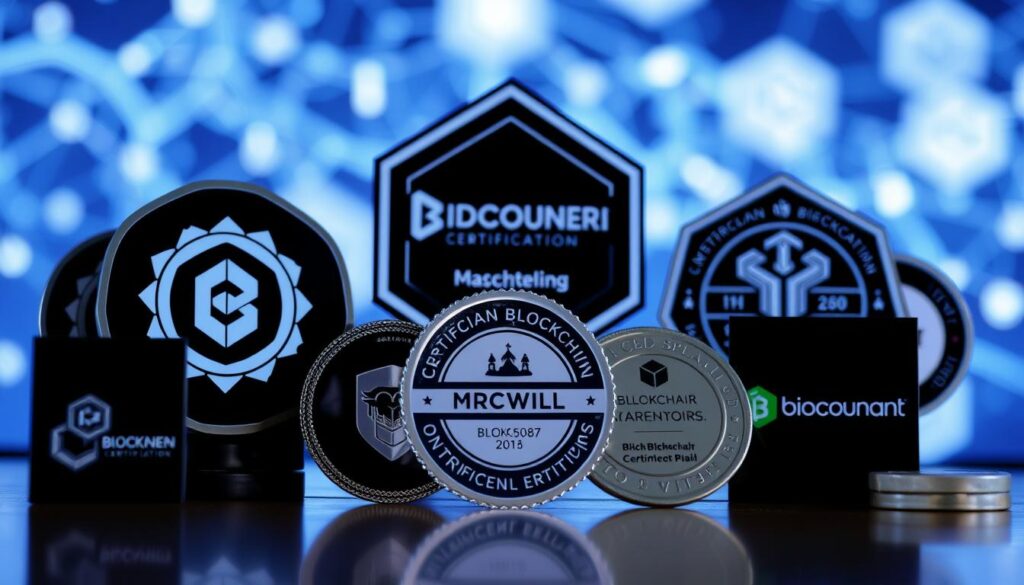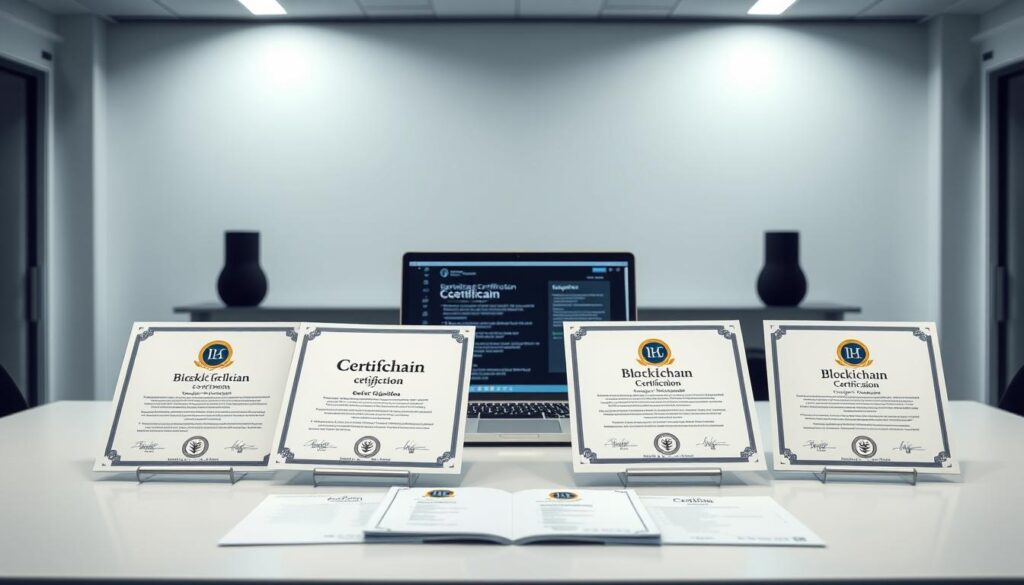The digital landscape is transforming at an incredible pace. Distributed ledger technology is reshaping how businesses operate across finance, healthcare, and supply chain management. This innovation represents a market valued at over $31 billion in 2024, with projections showing explosive growth through 2030.
As organizations explore practical applications of this groundbreaking technology, a new employment landscape is emerging. Companies seek skilled individuals who understand architectural principles, development frameworks, and project management approaches. These roles often come with premium compensation compared to traditional positions.
This guide helps you navigate the educational options available for professional growth. We examine various credentialing programs, their intended audiences, investment requirements, and the specific doors they open. Whether you work in software development, IT management, or business leadership, understanding which educational paths align with your goals is essential.
Key Takeaways
- The global market for distributed ledger systems shows remarkable growth potential
- Multiple industries now actively seek professionals with specialized knowledge
- Credentialing programs help validate expertise in a competitive job environment
- Structured learning paths provide foundational understanding of emerging systems
- Educational investments can accelerate career transitions and increase earning power
- Different programs cater to various technical depths and professional objectives
- Current market conditions create optimal timing for skill development
Understanding Blockchain Fundamentals and Certification Basics
The architecture behind modern digital ledgers creates unprecedented transparency and security for transactions. This technology organizes information in ways that prevent alteration while maintaining accessibility.
Introduction to Blockchain Technologies
Distributed systems operate through consensus mechanisms that validate entries across multiple nodes. Core concepts include cryptographic hashing and smart contracts that execute automatically when conditions meet.
These systems track assets and verify identities without intermediaries. Understanding how blocks connect through chains provides insight into immutable record-keeping.
Benefits of Earning a Certification
Credentials validate expertise in high-demand fields where practical knowledge matters most. They differentiate professionals in competitive job markets.
These achievements can lead to higher compensation and faster career advancement. The distinction between certifications and certificates helps candidates choose appropriate paths.
Both options demonstrate commitment to mastering emerging technologies. They fill experience gaps for professionals transitioning into new specializations.
Top Blockchain Certification Courses Worth Taking for Aspiring Professionals
The market for validated expertise in distributed systems continues to expand with several standout credentialing options. Leading providers including the Blockchain Council, UC Berkeley, and University at Buffalo offer structured learning paths.
These programs span from foundational knowledge to advanced technical specializations. Professionals can choose based on their current skill level and career objectives.

The Blockchain Council provides accessible entry points with their eight-hour Certified Blockchain Expert program. This self-paced option covers mining processes and real-world applications across multiple industries.
For technical depth, their Certified Blockchain Developer credential validates skills with platforms like Ethereum and Hyperledger. This pathway suits software engineers transitioning into distributed systems roles.
Academic institutions offer rigorous alternatives through platforms like edX and Coursera. UC Berkeley’s Professional Certificate examines bitcoin mechanics and enterprise implementations.
University at Buffalo’s specialization requires programming knowledge and covers node creation and smart contracts. Security-focused professionals might prefer the Certified Blockchain Security Expert program from 101 Blockchains.
These top blockchain certifications serve diverse audiences from developers to business leaders. Training durations range from intensive eight-hour courses to comprehensive multi-month programs.
In-Depth Look at Popular Blockchain Certification Programs
Training options in cryptographic ledger systems span from introductory overviews to specialized development tracks. These educational pathways help professionals build essential knowledge for today’s technology landscape.

Program Highlights and Key Elements
Leading educational offerings provide diverse approaches to skill building. ConsenSys Academy’s program covers business applications and technical foundations over nine hours.
LinkedIn Learning focuses on practical business implications across six hours of content. For technical depth, Educative’s text-based training targets Hyperledger Fabric development.
| Program Name | Focus Area | Duration | Key Features | Target Audience |
|---|---|---|---|---|
| Blockchain: Foundations | Business Applications | 9 hours | Self-paced, real-world cases | Managers & beginners |
| Getting Started in Blockchain | Strategic Understanding | 6 hours | Five-course series | Business leaders |
| Become a Blockchain Developer | Hyperledger Development | 6 hours | Hands-on exercises | Experienced programmers |
| Blockchain with Python | Technical Building | 2 hours | Interactive coding | Python developers |
| IBM Professional Certificate | Platform Fundamentals | 1 month | Multiple platforms | All experience levels |
Who Should Enroll
Business professionals benefit from programs focusing on strategic implementation. Technology managers gain insights into decentralized system operations.
Software engineers seeking blockchain developer roles should choose technical training. Those with programming experience can pursue specialized development paths.
Consider your current skill level and career objectives when selecting programs. Time commitment ranges from two hours to several months of learning.
Comparing Blockchain Certifications and Certificates
Professionals entering the blockchain field face important decisions about credentialing options. Understanding the differences helps you choose the right path for your goals.

Certification vs Certificate: Definitions and Distinctions
A blockchain certification confirms you passed an exam in a specialized area. This validation focuses on testing specific competencies.
Certificates show completion of educational programs. They include structured training and hands-on learning experiences.
The key difference lies in validation method. Certifications test existing knowledge through examinations. Certificates provide the education itself.
Impact on Career Advancement
These credentials affect job prospects differently. Certifications demonstrate proven expertise to employers. They fill experience gaps effectively.
Certificate programs build foundational knowledge from scratch. They offer guided learning for complex topics.
Strategic professionals often use both approaches. Start with certificates to gain essential training. Then pursue certifications to validate specialized skills.
This combination creates a powerful career development path. It balances education with recognized validation of expertise.
Unlocking Career Opportunities in Blockchain Technology
Professionals with expertise in decentralized networks command premium salaries in today’s market. The field offers diverse paths for technical and business-minded individuals alike.

Diverse Roles in the Blockchain Industry
Technical positions form the backbone of this expanding field. A blockchain developer earns approximately $106,403 annually, designing smart contracts and decentralized applications.
Senior technical roles like architects command over $140,000. These professionals design comprehensive systems and ensure security across platforms.
Security-focused positions are increasingly critical. Specialists audit code and protect distributed systems from emerging threats.
Finance-oriented careers blend technical knowledge with market analysis. Crypto analysts and traders leverage their understanding of digital assets.
Consulting roles help organizations implement solutions across industries. Strategic advisors bridge technical capabilities with business needs.
The industry continues to create opportunities beyond pure technical functions. Project management and business development roles also benefit from distributed ledger expertise.
How to Choose the Right Blockchain Course and Get Certified
Selecting the ideal educational path requires a clear strategy based on your starting point and professional destination. A thoughtful approach ensures your investment in learning delivers maximum value for your career.
Course Prerequisites and Learning Paths
Entry requirements vary widely. Some programs welcome complete beginners with no prior experience. Others demand knowledge of modern programming languages like Python or JavaScript.
Your career target dictates the best learning route. Technical roles need deep training in smart contract creation and system security. Business-focused professionals benefit from strategy-oriented programs.
Providers like the Blockchain Council offer specialized tracks. These paths allow you to build precise skills for roles in development, auditing, or architecture.
| Program Type | Typical Prerequisite | Primary Focus | Ideal For |
|---|---|---|---|
| Introductory | None | Foundational Concepts | Career Changers & Managers |
| Intermediate | Basic Tech Literacy | Business Applications | Analysts & Consultants |
| Advanced Technical | Programming Experience | Smart Contract Development | Software Engineers |
Exam Preparation and Study Strategies
Effective preparation goes beyond solo study. Join discussion groups and attend workshops to tackle difficult concepts. Learning from peers who have succeeded is invaluable.
Consider finding a mentor in the field. Guidance over several months can dramatically accelerate your understanding. They provide real-world context for your training.
Finally, weigh practical factors like cost and time commitment. Ensure the credential is recognized by employers in your target market. This makes your hard work pay off.
Conclusion
Today’s employment market presents unprecedented opportunities for those with validated expertise in emerging technologies. The rapid expansion of distributed systems across multiple industries creates high-demand roles with competitive compensation.
Beginner-friendly programs like the Blockchain Revolution Specialization offer accessible entry points. These learning paths help professionals understand practical applications in their field within approximately two months.
The current timing represents a strategic moment for career development. As organizations accelerate adoption, certified professionals gain significant advantages in this growing field. Mentorship and targeted preparation can enhance success in credentialing programs.
Validated expertise in this transformative technology positions individuals for leadership roles across sectors. The investment in specialized knowledge delivers substantial returns through career advancement and increased earning potential.
FAQ
What is the main difference between a blockchain certification and a certificate?
A certification is a formal credential awarded by a recognized body after you pass a rigorous exam, proving your skills. A certificate is often given for completing a training program without a standardized test. Certifications generally hold more weight with employers for career advancement.
How long does it typically take to complete a blockchain developer certification?
The timeline varies by program and your experience. Some intensive courses can be finished in a few months, while more comprehensive training for professionals might take six months or longer, especially if you are balancing it with a full-time job.
Are there any prerequisites for enrolling in a top blockchain course?
A> Yes, many programs require a foundational understanding of programming languages like Python or JavaScript. A background in software development, data structures, or basic cryptography is also highly beneficial for success in the learning path.
What kind of career opportunities can a certified blockchain professional expect?
Earning a credential opens doors to diverse roles such as blockchain developer, smart contract engineer, and solutions architect. The industry demand is strong in sectors like finance, supply chain, and healthcare, offering promising job prospects.
How important is hands-on project experience in these training programs?
Extremely important. The best programs include building real-world applications and smart contracts. This practical experience is crucial for applying concepts and is highly valued by companies looking for developers who can contribute immediately.
What should I look for when choosing a certification program?
Focus on the curriculum’s depth, the institution’s reputation, and opportunities for practical learning. Also, check if the program covers essential topics like blockchain security, consensus mechanisms, and decentralized application (dApp) development to ensure comprehensive knowledge.


No comments yet